
The genocide of Bosnia, with three million displaced, about 300,000 murdered and over 50,000 raped, was taken up as their own cause by Muslims in the United States. More than 50 percent of Bosnian Muslims were made refugees in the heart of Europe as a result of this "ethnic cleansing" as its proponents described this policy.
After courageous journalists like Newsday's Roy Gutman broke the story of the Serbian concentration camps, and publications like Newsweek highlighted the rape of Bosnian women, American Muslims decided to stay silent no longer. They got organized and mobilized on a national level for the first time. The cause: to request action by our government to stop the genocide in Bosnia and to lift the arms embargo that had been slapped on the country by the United Nations so that the Bosnians could defend themselves.
It was as if American Muslims got a sudden wake up call after seeing the horrors. Perhaps they figured that if white-skinned Muslims were not tolerated on Europe's soil, what about American Muslims, who are generally people of color in this country? Should we not stand up against injustice for once instead of clucking our tongues in sympathy and then forgetting about the issue?
Organizing Bosnia Task Force, USA
It started in the summer of 1992 in Chicago. Muslims do not have a national federation representing Muslims, like the Muslim Council of Britain. Nonetheless, Imams and leaders of Chicago's Muslim community gathered and decided to work towards ensuring that this became a top national issue. The way they could help was by ensuring that the American government's policies led to saving lives in Bosnia. On their request, I had the honor of calling a conference call to organize the Bosnia Task Force, USA (BTF).
BTF was an alliance of ten organizations which included the following groups: the Ministry of Imam W Deen Mohammed, the Islamic Society of North America, the Islamic Circle of North America, the Bosnia Action Committee-Chicago, the Majlis Shura of New York, the Islamic Shura Council of Greater Los Angeles, the Council of Islamic Organizations of Michigan, the Islamic Society of Greater Houston, the National Community and the Balkan Muslim Association.
BTF had four organizational components to it: the national leadership, the network of Masjids, its secretariat and its Chicago team. The national leadership established the legitimacy of the task force. It made basic decisions through conference calls without ever meeting face to face. However, these were 1,600 Masjids that provided the main point of communication and mobilization for BTF. There developed a small band of volunteers in Chicago who developed strategies and action plans.
In the first six months of the Task Force's existence, its offices were located at ISNA's headquarters in Indiana. Later, with their consent and on the insistence of the Muslim leadership in Chicago, which originally helped formed the coalition, the secretariat was set up. It consisted of a small desk, a computer, a fax machine and two phones in the basement office of Sound Vision in downtown Chicago. It was essentially the sprit of Muslim unity for the cause of Bosnia, which brought all Muslims to work together.
We developed a system of quickly informing the community throughout the US when action was needed. These were the days when emails were still limited in usage and the web was not yet available to the average person. Fax and phone networks therefore were the primary means of communication. Volunteers throughout the country would use them to send out copies of the weekly action alerts entitled, "Bosnia Update," which would be distributed in their Masjids.
It would be wrong to claim much credit for Bosnia Task Force, USA since the work to stop genocide in Bosnia became a true grassroots movement in the Muslim community. Many people sacrificed their time and jobs to work tirelessly to stop genocide in Bosnia.
The work of the Bosnia Task Forces, USA came to a halt as the Dayton Accord was signed. Most Muslims and people of other faiths, like the Bosnians, believed that it was not just. However, the agreement did stop genocide at that time which was the main goal of BTF.
The Main Demands:
The main demands of the Bosnia Task Force were as following:
-
Declare Serbian "ethnic cleansing" to be genocide.
-
The UN should lift its arms embargo from Bosnia and Croatia so citizens could defend themselves against the well-armed and well-trained army of the former Yugoslavia. This was in line with the UN Charter Article 51.
-
Rape be declared a war crime.
-
Bosnia's national integrity as a multi-ethnic and multi-religious country be preserved.
-
War criminals responsible for rape and ethnic cleansing be tried by an international war crime tribunal.
There were many other demands that were made on different occasions throughout this three-year campaign. However, the above demands were the most important ones that BTF pursued.
Muslim Delegation to the UN:
Considering that this was an international issue about which the United Nations was silent, the Muslim community's leadership in Chicago decided to send a delegation of Muslim leaders that would visit ambassadors at the UN. The aim was to ask ambassadors of leading nations, along with Muslim ambassadors, to use their efforts to pressure the UN to act to stop genocide in Bosnia.
For our delegation to the UN, we picked a number of Muslim leaders from across the US. But we lacked the presence of someone who could give the delegation some "star power" that would gain attention to the cause.
That's why we asked Muhammad Ali to accompany it. Alhamdu lillah, his presence gained significant attention as an entire corps of UN reporters descended on the delegation to cover Muhammad Ali, one of the greatest boxing stars of all time.
The delegation met the UN ambassadors of France, Spain, Djibouti, Pakistan, Bosnia, Turkey, Malaysia, Iran and Saudi Arabia.
One incident during the delegation's visit to the UN was highly significant for Muslim Americans: the honesty of the Djibouti ambassador. While other Muslim ambassadors were busy fawning over Muhammad Ali (some even asked for his autograph), the Djibouti ambassador stood up in the initial minutes of the meeting and said curtly, "my government does what your government tells them to do so please don't waste your time or my time trying to convince us to do something about Bosnia. I'm all for it." He was at that time also the rotating chair of the OIC (Organization of Islamic Conference) group at the UN.
Arms Embargo on Bosnia:
The UN was neither willing to defend the victims of genocide nor was it willing to let them defend themselves. The arms embargo was one of the most painful aspects of genocide in Bosnia. Whereas the whole infrastructure of the former Yugoslavian army was available to Serbs bent on "ethnic cleansing," Bosnians were mostly armless. In certain cities like Srebenica, their WW II guns were even taken away by the UN on the pretext of protecting them in UN-declared "safe zones".
Muslims met, called and wrote to their senators and representatives throughout the US, asking them to help lift the arms embargo on Bosnia.
Success came on January 27th 1994, when the US Senate finally passed a resolution (SR 11) asking for the lifting the arms embargo.
Congressional Action:
There were several resolutions regarding Bosnia that were introduced in both houses of Congress. Some passed some did not. But this was probably the first time Muslims began fulfilling their responsibility as citizens to speak up for justice. Bosnia Task Force working with several other groups including the Helsinki Commission and the National Organization of Women (NOW). We had several efforts synchronized at the Congressional level.
About 700 Masjids in North America were provided with a poster listing BTF's demands along with local and national congressional office information for their district.
Several Congressional education days were organized.
Senators Russell Feingold, Joseph Biden, Joseph Liberman, and Congressman Frank McCloskey were some of the most outspoken members of Congress against the genocide in Bosnia.
The White House:
The White House became pretty familiar with BTF's demands. The switchboard operators of the comment line could at times even guess which one of us was calling. They would then take the caller's name and add it to the list of the callers for those demands saving themselves some time.
Bosnia Task Force mobilized Muslims to send an estimated half a million letters to then President Bill Clinton about the issue, along with about 100,000 phone calls to the White House.
Although the President never honored our request to meet the Muslim leadership, the demands of the loud rallies reached him. After the Dayton Accord was signed, Hillary Clinton invited Muslim leaders for a lunch meeting.
President Clinton finally took action by ordering the bombardment of Serbian positions forcing them to stop the genocidal war. Muslims were the main group who had been rallying for that cause for over 30 months. The UN did not move, the Europeans did not move, the Muslim world did nothing, but the genocide did stop when America came into action.
The Historic Rallies in Washington, DC and New York:
There were hundreds of rallies across America against the genocide. Most were called for by the Bosnia Task Force, USA. But many were independent initiatives. Three major rallies were called by BTF.
The first nationwide demonstrations were called on February 21st 1993 to protest war crimes in Bosnia and to demand that rape be declared a war crime. Based on our dialog with the National Organization of Women (NOW), it also gave a call for joint demonstrations. These were well covered in the media. In Chicago, more than a 1,000 women participated in the rally.
The largest rally took place on May 15th 1993 in Washington, DC. It is probably the largest rally organized by Muslims in the US so far. At least 50,000 people attended the event at the Washington Mall. Some estimates put attendance at more than 100,000. This also became what is probably the first Muslim event to receive national news media coverage.
The last major rally took place in front of the United Nations in New York in 1995. It was the fiftieth anniversary of UN's establishment when it presided over the genocidal massacre in Srebenica in July 1995. Close to 25,000 people marched in New York that day demanding the UN end the arms embargo on Bosnia. The attendance was a lot smaller as the US has started some bombing on Serb positions by that point.
Rape as a War Crime:
Rape became a key issue during the Bosnian war. Reportedly 50,000 to 60,000 women were raped. This became a weapon of choice in the Serbian ethnic cleansing program of genocide. It was estimated that more than 30 rape camps existed until the end of the genocide.
Volunteers of Bosnia Task Force, USA, led by Sr. Amina Assilmi, entered into a dialog with the National Organization of Women (NOW) to protest rape and to have it declared a war crime. Joint rallies were organized in several cities across the country. In Chicago, 1,000 women rallied in front of the Federal Plaza.
In the beginning of 1993, packages about rape in Bosnia were hand-delivered by Muslim volunteers to 150 members of Congress along with the January 4, 1993 issue of Newsweek. That edition featured a cover story about rape as an instrument of ethnic cleansing in Bosnia.
Many other organizations joined in the effort. Working with sympathetic Congressional leaders, a Congressional resolution was pushed by the BTF asking for rape to be declared a war crime.
The resolution passed and eventually the United Nations declared rape a war crime based primarily on the horrific experiences Bosnian women were facing at the time.
Development of Relief Organizations:
At the beginning of the Afghan struggle against the Soviet occupation in the early 1980s, private relief organizations had started emerging in the US. It was the genocide in Bosnia, however, which gave them much momentum. Many of them began to devote programs to help Muslims in Bosnia and solicited funds from American Muslims for the cause. Some organizations even got their start with the Bosnia issue.
Islamic Shura Council of North America:
With the signing of the Dayton Accord, BTF's work started winding down. The challenge the volunteer team faced was the future of Muslim unity in America. The Bosnia movement had brought Muslims in the country to work together for a common cause developing them into a community. The question was how to translate this energy into something lasting. After consultations, we developed an idea for the Islamic Shura Council of North America. It was presented to the secretaries of the four leading Muslim organizations in a meeting hosted at Sound Vision in Chicago. The Secretary Generals of ISNA, ICNA, the Ministry of Imam W. D. Mohammed and of the National Community (Imam Jamil Al-Amin's) participated in two-day long deliberations agreeing in principle to take the idea to their leadership. It took another year before these organizations announced the formation of the Shura Council, which now seems another lost chapter in Muslim coordination efforts at the National level.
Remembering other supporters:
Some friends of Bosnia must be remembered as well. They demonstrated courage and strength in the US and outside it for the cause of Bosnia.
These individuals include several employees of the US state Department who resigned over America's policy of appeasement in the former Yugoslavia; many individuals from all over the world who personally went to Bosnia to help its citizens defend themselves. Some were Americans, some were Europeans and some were Asians. A good number of them were Muslims, but a substantial number were non-Muslims as well.
Another soul to remember is the late Alija Izetbegovic, who presented the vision of a European country reminiscent of Muslim Spain, where people of all faiths lived together and contributed to civilization together. Unlike Serbs and Croats, Muslims wanted a multi-religious and multi-ethnic state where everyone worked together for everyone's benefit instead of claiming an Islamic state. And they stuck to that idea even after the Serbs and Croats were killing them. Some Orthodox Serb and Catholic Croats who believed in the idea fought on the side of Bosnians for this vision.
Lesson Learned!
The American Muslim community learned five lessons from the tragedy in Bosnia.
First, if Muslims participate in the American political system, including at the grassroots level, it is to their benefit.
Second, historical Islamophobia is strong enough to lead to groups and governments adopting genocidal policies, as the Serbs did, or look the other way when it happens, as the rest of Europe did.
Third, if Muslims come together and work with each other, they can achieve better results in the political arena than if they work in organizational isolation.
Fourth, for common causes, even socially conservative Muslims and radically liberal groups like NOW can work together by forming coalitions.
Fifth, Muslims in North America can be united.
Conclusions:
Muslims need to apply these lessons today to their community. The key issue that must be addressed now is the rights of Muslims as equal citizens in America today. Although Muslims have been the primary victims of civil rights abuses post-9/11, this is an issue that concerns all Americans, even more so than the Bosnia issue. And as we know from that cause, Muslims can unite if they want to. It's just a matter of developing a will for it. Once that's been done, the way will be clear.
Author's Note: This article is written essentially based on memory. I invite others who participated in the Bosnia movement to provide their information for future update since this history is never written. The author served as the national coordinator of Bosnia Task Force USA.
Photo Attribution: http://commons.wikimedia.org/wiki/File:Graves_srebrenica_bosnia_and_herzegovina.jpg

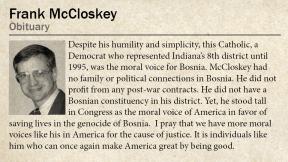
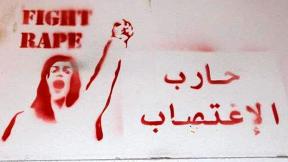
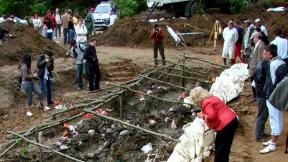
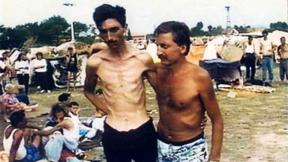
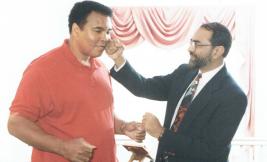


Add new comment